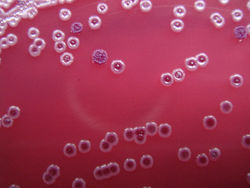Difference between revisions of "Burkholderia species - Overview"
Jump to navigation
Jump to search
| Line 1: | Line 1: | ||
| − | {{ | + | {{review}} |
| − | [[File:Burkholderia.jpg|right|thumb|250px|<small><center> Burkholderia pseudomallei colonies on Ashdown agar. (Gak 2008, Wikimedia commons)</center></small>]] | + | [[File:Burkholderia.jpg|right|thumb|250px|<small><center> ''Burkholderia pseudomallei'' colonies on Ashdown agar. (Gak 2008, Wikimedia commons)</center></small>]] |
The ''Burkholderia'' species are Gram-negative rods. They are obligate aerobes and are oxidase and catalase positive. The genus includes animal, human and plant pathogens. | The ''Burkholderia'' species are Gram-negative rods. They are obligate aerobes and are oxidase and catalase positive. The genus includes animal, human and plant pathogens. | ||
| Line 12: | Line 12: | ||
[[Category:To_Do_-_AimeeHicks]][[Category:Pseudomonas_and_Burkholderia_species]] | [[Category:To_Do_-_AimeeHicks]][[Category:Pseudomonas_and_Burkholderia_species]] | ||
| − | [[Category: | + | [[Category:Wxpert_Review]] |
Revision as of 19:21, 26 July 2010
| This article has been peer reviewed but is awaiting expert review. If you would like to help with this, please see more information about expert reviewing. |
The Burkholderia species are Gram-negative rods. They are obligate aerobes and are oxidase and catalase positive. The genus includes animal, human and plant pathogens.
Some species of Burkholderia bacteria are motile, including Burkholderia pseudomallei, as it has polar flagellae.
The Burkholderia species were previously part of the Pseudomonas genus.
